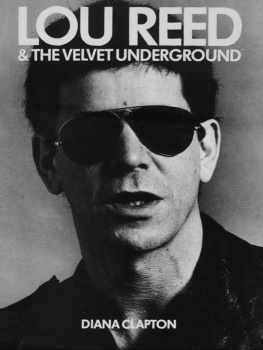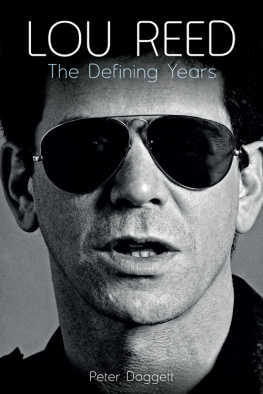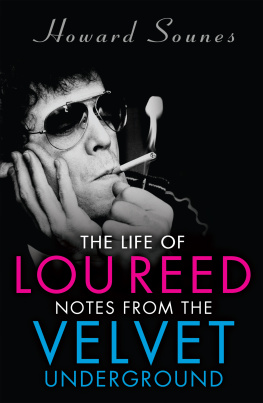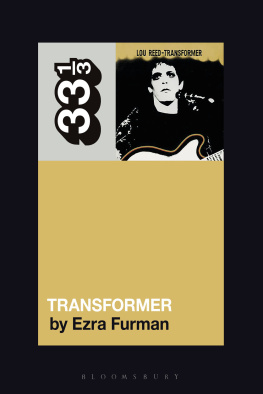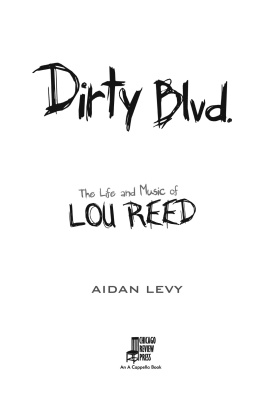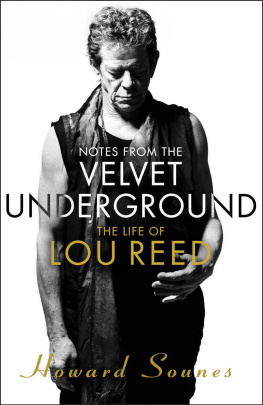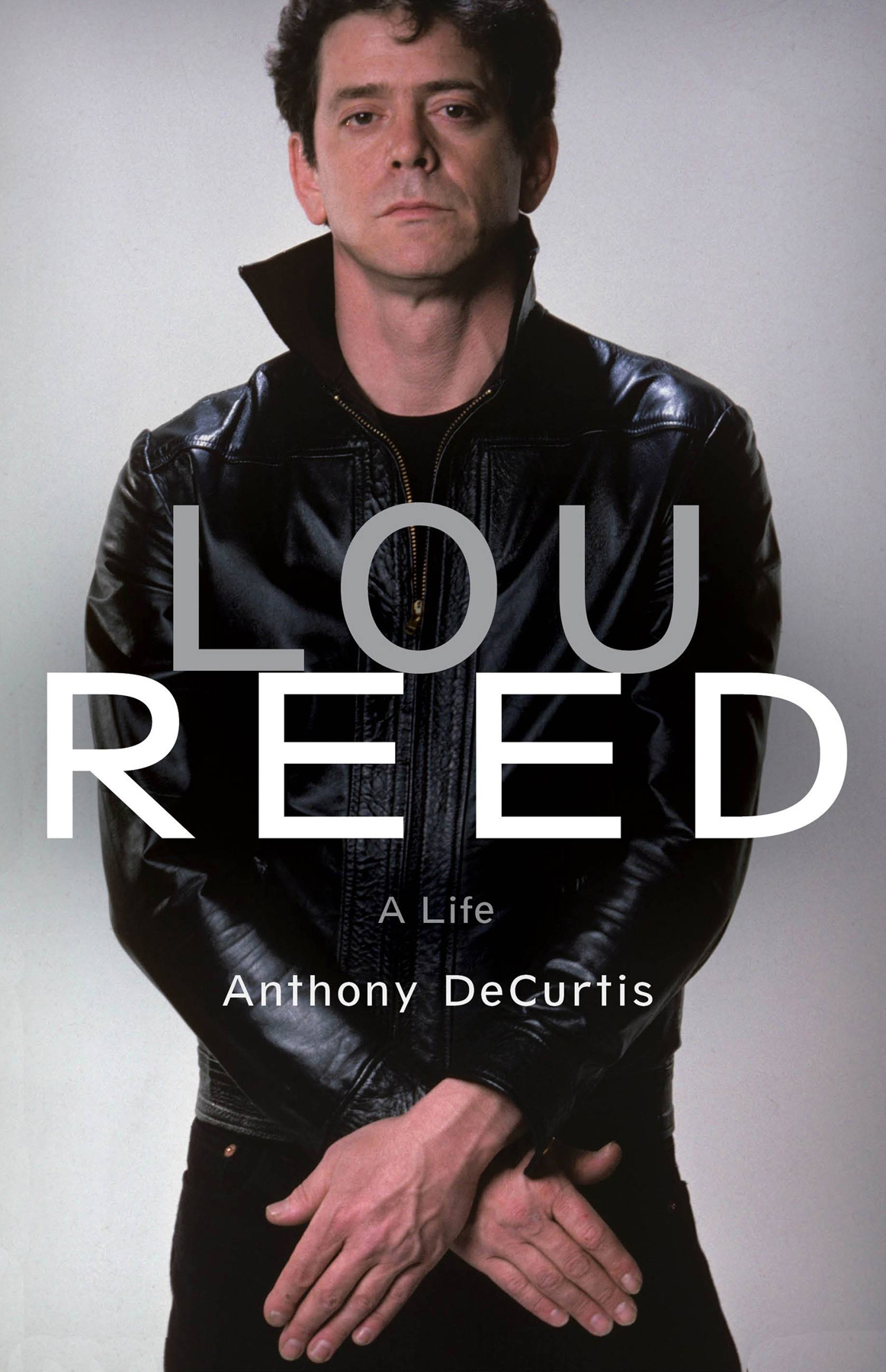P EOPLE ALWAYS SAY TO me, Why dont you get along with critics? Lou Reed told me one night in 2012. I tell them, I get along fine with Anthony DeCurtis. Shuts them right up. We were sitting in the dining room of the Kelly Writers House at the University of Pennsylvania, where I teach creative writing. Id brought Lou down to do an interview with me in front of fifty or so invited guests and to have dinner with a dozen students, faculty members, musicians, and local media luminaries. As with so many things with Lou, it was touch-and-go until the very end.
Getting Lou to come to Penn, which is in Philadelphia, was complicated. Arrangements for his visit had been made months in advance with his manager, who assured me that Lou had approved them. The Kelly Writers House is an actual thirteen-room house in the heart of the Penn campus, and the interview would take place in the front room. Lou would be paid a modest fee, and the agenda was a brief reception, an hour-long interview, and a home-cooked meal served at the Writers House afterward. Patti Smith, Suzanne Vega, and Rufus Wainwright had all done it in previous years and had a great time. But Lou was different. I knew it was asking a lot of someone who didnt typically relish events of this kind, and I wanted to make sure in advance that he understood what the evening entailed. His manager assured me that he did.
But two days before the event, Lous manager called and asked me if I would speak to Lou. Lou now wanted to do only the interviewnot the reception, not the dinner. The intimacy of the event was the whole point, so that wasnt acceptable. But Lou was adamant. When I called the next day, Lou answered Hello? with a voice that sounded as if it was coming from inside a crypt. I explained the situation, and he matter-of-factly responded, Well, we dont have to do any of it. The genial artist I had known for years had transformed into Lou Reed. When we ended the conversation, I had no idea if he was going to show up or not.
He did show up. When he arrived, he greeted me warmly, as if nothing untoward had happened the day before, and we went into a faculty office that served as his greenroom. For his rider, Reed had requested kielbasawhich had caused great mirth for me and the Writers House staff. What would the fearsome Lou Reed insist on? Boys? Girls? Drugs? No, kielbasa. I later learned that kielbasa was necessary: it helped with his diabetes. A platter of meats and cheeses from Philadelphias famed Di Bruno Bros. gourmet shop was brought to us, and Reed began chatting with me as if we had all the time in the world.
As we talked, I could hear the guests gathering downstairs for the reception. Reed, meanwhile, picked up a piece of prosciutto and, after tasting it, launched into an encomium to its excellence. It was, without question, the best prosciutto he had ever had. Could I please tell him where he could get some for himself? I introduced him to the woman who had ordered the food, and he peppered her with thanks and questions. In the meantime, the reception was now fully under way. People peeked into the room every few minutes to see if we would be coming out anytime soon. I decided the reception would have to be sacrificed. Lou was in a good mood, and if the interview went well, he might be willing to stay for dinner. We continued to enjoy the food, and finally I stood up and said, We should probably go do our talk. He looked as if he had completely forgotten about it, but he stood up and followed me downstairs and into the front room.
When we emerged I could feel the audiences tense energy. Lou, of course, seemed impervious. That kind of tension was the emotional sea he swam in, the air he breathed. The room was small, and it was packed. A number of people had traveled great distances to be there. Everyone had known that Lou was in the house, but his not emerging for the reception lent the gathering an edge. This was Lou Reed, after all. Maybe he would walk out. When we sat down in the two chairs set up in the front of the room, we adjusted our mics, and I thanked Reed for coming. Anything for you, he said. Our conversation rambled on for an hour. We talked about writing, Andy Warhol, Delmore Schwartz, the Velvet Underground, and Laurie Anderson. We took questions from the audience, and then we were done.
Now Lou was in a great mood. He remained in his seat as people came by to say hello and brought memorabilia for him to sign. He was gracious to everyone, and looked over the rarities presented to him, mentioning that even he didnt have copies of some of them. Then, after about fifteen minutes, he joined us for dinner. Everyone got their Lou Reed story. And I got my compliment.
I D GOTTEN TO KNOW Lou from writing about him in Rolling Stone and elsewhere, and over the course of more than fifteen years wed regularly run into each other in New Yorkat clubs and concerts, at restaurants and parties. I always felt that one of the reasons Lou and I got along well was that we met socially before we ever met as artist and critic. In June of 1995 I got stuck at the airport in Cleveland, where I had gone to cover the concert celebrating the opening of the Rock and Roll Hall of Fame. Backed by Soul Asylum, Lou had turned in a roaring version of Sweet Jane as part of that show. My flight back to New York was delayed for hours and I was settling in for the wait when I ran into a record company friend, who introduced me to Lou and Laurie. Theres nothing like an interminable flight delay to grease the gears of socialization.
You reviewed New York for Rolling Stone, right? Reed asked, referring to his classic 1989 album.



